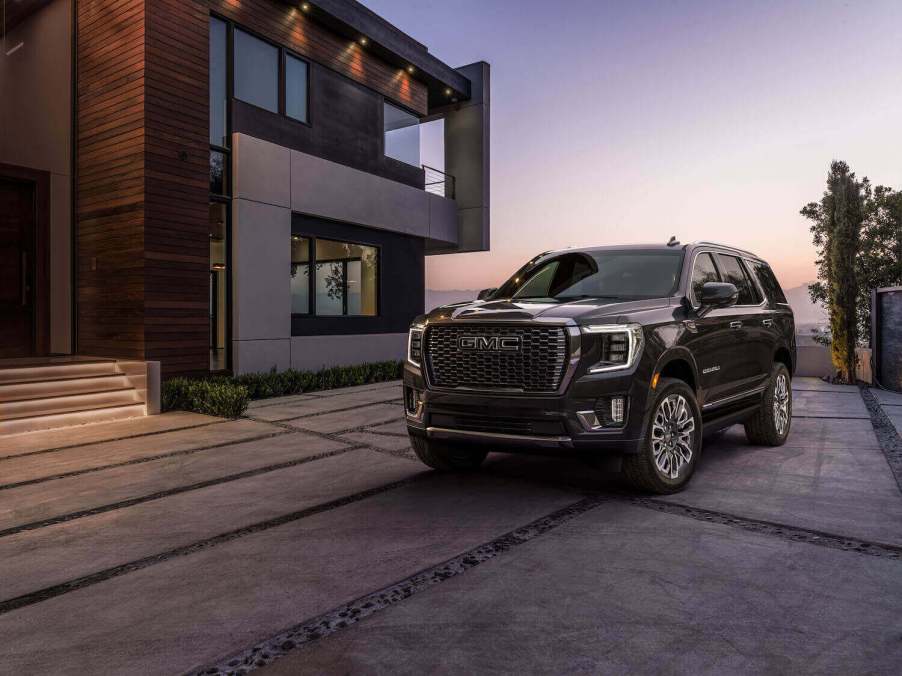
The Predictable Area of Their SUVs GMC Yukon Owners Like Least
If you’re a GMC Yukon owner, chances are you love the spaciousness, power, and style that come with this full-size SUV. However, like any vehicle, there are bound to be some areas that are less popular among drivers. In fact, we’ve surveyed GMC Yukon owners to find out which aspect of the SUV they like least.
So, if you’re considering purchasing a Yukon or just curious about what current owners have to say, keep reading to find out the predictable areas of their SUVs that GMC Yukon owners like the least.

J.D. Power’s expert analysis of the GMC Yukon
The 2023 GMC Yukon is a full-size, 3-row SUV that competes in the large SUV market segment. The SUV can seat up to eight passengers and tow up to 8,000 pounds. GMC offers the 2023 Yukon in five trim levels, with the luxurious Yukon Denali Ultimate at the top of the lineup.
The Denali Ultimate adds an impressive feature list, standout styling, and an elegant, high-end interior. In the 2022 APEAL Study, the Yukon ranks third out of five large SUV models.
According to J.D. Power, the most favorite things about the Yukon include its exterior styling, driving feel, and powertrain, while its fuel economy is the least favorite. The Denali Ultimate equipped with the Super Cruise and Titanium Rush Metallic exterior paint has full-grain leather seats, open-pore Paldao wood trimming the dashboard and doors, and a Bose Performance 18-speaker audio system.
It also has a standard rear-seat entertainment system with dual 12.6-inch color touch HD screens mounted on the front seatbacks. The Yukon’s styling has a classic SUV shape with a large, squared-off grille up front. The Denali Ultimate adds Vader Chrome trims to the large grille, with a darker finish for a more premium look.
The cost of owning a full-size SUV
As mentioned in the APEAL Study, fuel economy was listed as the least favorite aspect of the 2023 GMC Yukon by owners. This is not surprising, given that the SUV has a relatively poor fuel economy compared to smaller and more fuel-efficient vehicles. As a large, 3-row SUV, the Yukon is designed to prioritize passenger and cargo space and towing capacity over fuel efficiency.
The EPA estimates that the Yukon’s fuel economy ranges from 16–21 mpg in the city and 20–27 mpg on the highway, depending on the engine and drivetrain configuration. While these numbers are comparable to those of other large SUVs on the market, they are significantly lower than what you would expect from smaller vehicles or hybrid models.
Indeed, when it comes to large SUVs like the GMC Yukon, there are certain tradeoffs that come with the territory. In order to offer a vehicle with such a spacious and versatile interior, the manufacturer must make sacrifices in other areas, such as fuel economy. The large size and weight of the Yukon make it less aerodynamic and more demanding on fuel than smaller, more efficient vehicles.
The value proposition of the GMC Yukon
While it’s true that poor fuel economy can result in higher operating costs for the owner, it’s important to consider the value proposition of the vehicle. For many drivers, the ability to carry many passengers or tow heavy loads is worth the extra fuel expense.
Additionally, the GMC Yukon is designed to provide a high level of comfort, convenience, and luxury features that are often not found in smaller vehicles. These features can add to the vehicle’s overall appeal and justify its higher cost of ownership.
Ultimately, the decision to purchase a large SUV like the GMC Yukon involves weighing the pros and cons of the vehicle, including its fuel economy. While it may not be the most efficient choice, it offers a unique combination of size, capability, and features that make it a compelling option for drivers who need a vehicle of its size and capabilities.


